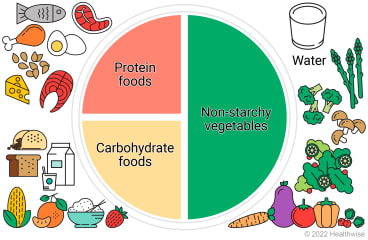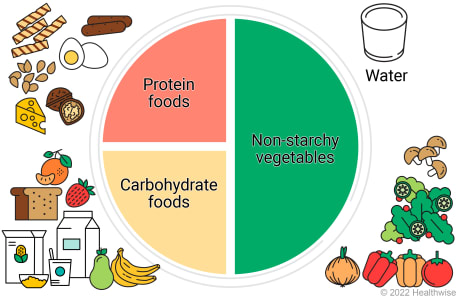Our Health Library information does not replace the advice of a doctor. Please be advised that this information is made available to assist our patients to learn more about their health. Our providers may not see and/or treat all topics found herein.
Diabetes: Using a Plate Format to Plan Meals
Overview
The diabetes plate method is a simple way to plan meals and manage the amount of carbohydrate you eat. Put non-starchy vegetables on half your plate. Add protein foods, like meat or meat substitutes, on a fourth of the plate. Put carbohydrate foods, like grains, starchy vegetables, beans, fruit, and milk and yogurt, on the final fourth of the plate. Choose water or another low-calorie beverage to drink with your meal.
How to use a plate format
Here is a simple way to manage the amount of carbohydrate you eat at meals.
Sample lunch or dinner plate

Follow these guidelines for lunch and dinner. Use a plate that measures 9 inches (23 cm) across.
- Half the plate is non-starchy vegetables. Some examples are broccoli, carrots, cauliflower, mushrooms, peppers, and salad greens.
- A fourth of the plate is protein foods. These include chicken, turkey, lean beef and pork, fish, tofu, nuts, eggs, and cheese.
- A fourth of the plate is carbohydrate foods. These include grains, fruit, yogurt and milk, and starchy vegetables like potatoes, corn, and beans.
- Choose water or another low-calorie drink. Water is a good choice with meals. Other examples of low-calorie drinks include sparkling water or unsweetened tea or coffee.
Sample breakfast plate

For breakfast, the concept is similar.
- Half the plate is non-starchy vegetables. You can leave this section of your plate empty if you don't usually eat vegetables at breakfast.
- A fourth of the plate is protein foods.
- A fourth of the plate is carbohydrate foods.
- Choose water or another low-calorie drink.
Credits
Current as of: October 7, 2024
Author: Ignite Healthwise, LLC Staff
Clinical Review Board
All Ignite Healthwise, LLC education is reviewed by a team that includes physicians, nurses, advanced practitioners, registered dieticians, and other healthcare professionals.
Current as of: October 7, 2024
Author: Ignite Healthwise, LLC Staff
Clinical Review Board
All Ignite Healthwise, LLC education is reviewed by a team that includes physicians, nurses, advanced practitioners, registered dieticians, and other healthcare professionals.
This information does not replace the advice of a doctor. Ignite Healthwise, LLC disclaims any warranty or liability for your use of this information. Your use of this information means that you agree to the Terms of Use and Privacy Policy. Learn how we develop our content.
To learn more about Ignite Healthwise, LLC, visit webmdignite.com.
© 2024-2025 Ignite Healthwise, LLC.



